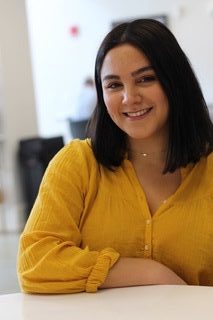Meet the New Intern: Julia Shapiro

Please welcome Julia Shapiro, summer intern at the Center for Freethought Equality!
TheHumanist.com: What is your educational and work background?
I am a rising junior at the University of Florida in Gainesville, Florida, studying history and political science. Within my majors, I focus on European politics and the populist Right, as well as early modern European history and American political history.
Before this internship, I worked for Representative Lois Frankel (D-FL) in my hometown in South Florida as a regional office intern. I’ve also interned at the Anti-Defamation League in Florida and in New York as a campus and special projects intern. Most recently, I worked for a progressive political communications firm in Florida called Statecraft Digital.

Julia Shapiro
TheHumanist.com: How did you first learn about humanism?
I’ve always known about the concept of humanism through the history books I read as a young kid, albeit without knowing its name. I learned about humanism specifically in my high school history courses, when we studied the Enlightenment period and particularly the French and American Revolutions.
TheHumanist.com: Did you grow up in a traditional religious faith? How did it impact you?
I grew up in the Reform Jewish community and it was a very positive experience for me. I still enjoy many aspects of my faith and participate in holidays and rituals but still put science and reason first. Throughout my childhood, I was encouraged by clergy and teachers at my temple to question my faith and to find my own version of Judaism. In general, my experience with Reform Judaism was very progressive, and it encouraged a lot of personal curiosity and thought when I was growing up.
TheHumanist.com: What interested you most about working for the American Humanist Association?
It’s important to me to work with organizations that are doing good every single day. Especially during this stressful election cycle, I wanted to work with people who share my values and are trying to create a more progressive and ethical world. AHA is doing exactly that.
TheHumanist.com: What book has influenced you the most?
I’m in the process of reading How Democracies Die by Steven Levitsky and Daniel Ziblatt (2018), and it’s very eye-opening. I think the last few years studying right-wing populism and the politics of the European Union have made me a bit of a pessimist about democracy, and this book is reminding me of how truly fragile democracy is. As the book asserts, no country is immune to democratic backsliding, including the United States. Reading this book has made me more aware of the forces that are eroding American democracy, like misinformation, lack of education, inequality, and democratic dissatisfaction. I think it’s made me a stronger advocate for democracy in general.
TheHumanist.com: If you could have dinner with any three people in the world (living or dead), who would they be and why?
My first guest would have to be Catherine the Great. I read her biography as a kid and recently watched a new show about her rise to power; she was a really fascinating person and a genuine humanist. She entered the Russian court as a poor German teen bride and died as one if its greatest rulers. Catherine also lived a very free life, and I think she’d have fascinating stories to tell.
I’d also invite Eleanor of Aquitaine. I read her biography as well, and she had an incredible life (and also managed to live to the age of eighty-two during the thirteenth century, which is pretty amazing). She was queen of France and England during her lifetime, had ten children, and made herself one of the most powerful women of the medieval era. I’d want to know her health tips, because she lived longer than many people do today in a time when medicine was pretty abysmal.
My third guest would have to be Trevor Noah—I think he’d add some humor and facilitate a great conversation. He can interview anyone, and The Daily Show is never boring. He also speaks seven (!) languages, so it might make the language barrier a bit easier.
